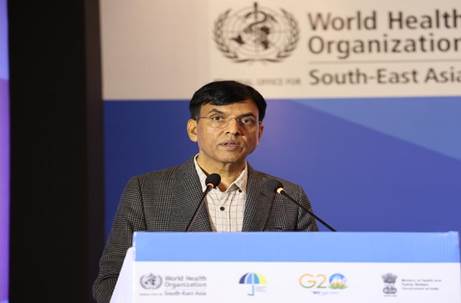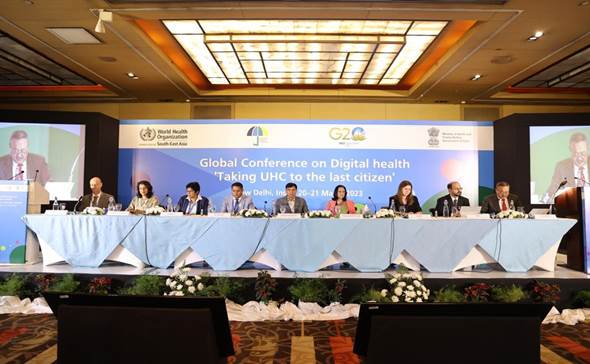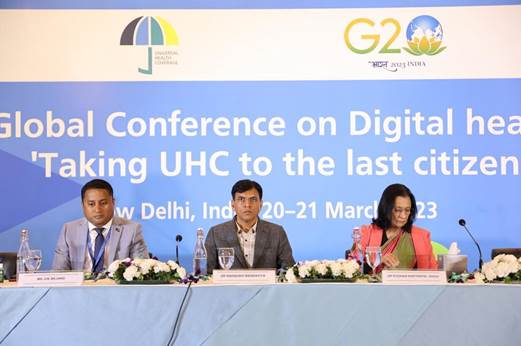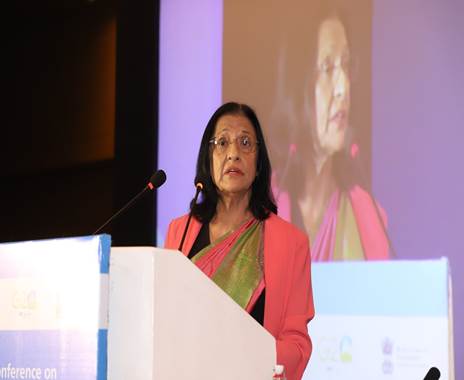Ministry of Health and Family Welfare
Dr Mansukh Mandaviya delivers keynote address on Digital transformation Challenges, Opportunities and Success on the concluding day of the Global Conference on Digital Health
“Digital Health interventions are not just limited to individual healthcare delivery programs, but are spread across multiple health outcomes, catering to both communicable and non-communicable diseases across the health and disease burden spectrum”
India has taken a quantum leap towards leveraging digital health solutions for effective health service delivery: Dr Mansukh Mandaviya
“Under ABDM, over 332 million unique patient IDs (ABHA IDs), more than 200,000 Health Facility Registries & over 144,000 Health Professional Registries have been created”
India is not only working towards creating an enabling ecosystem for digital health in country; implementation and scaling up of these digital interventions is parallelly focused upon: Dr Mandaviya
“Under the G20 motto of One Earth, One Family, One Future, India is working towards greater collaboration and sustained efforts across the digital health ecosystem”
प्रविष्टि तिथि:
21 MAR 2023 1:49PM by PIB Delhi
“Digital Health interventions are not just limited to individual healthcare delivery programs, but are spread across multiple health outcomes, catering to both communicable and non-communicable diseases across the health and disease burden spectrum”. This was stated by Dr. Mansukh Mandaviya, Union Minister for Health & Family Welfare during his address at the concluding day of the “Global Conference on Digital Health – Taking Universal Health Coverage to the Last Citizen” a co-branded event under India’s G20 Presidency organized by WHO – South-East Asia Region in collaboration with the Ministry of Health & Family Welfare, Government of India. He was joined by Mr Joe Bejang, Minister of Health and Human Services, Republic of Marshall Islands and Dr Poonam Khetrapal Singh, Regional Director, WHO South-East Asia Region. Other dignitaries who were present at the High-Level Plenary included Ms. Nina Bergstedt, Senior Adviser, Office for Data Infrastructure and Cyber Security, Ministry of Interior and Health of Denmark; Mrs. Bernardina De Sousa, National Deputy Director for Health Training, Ministry of Health, Mozambique; Mr Bader Awladthani, Director-General of Information Technology, Sultanate of Oman and Dr Preetha Rajaraman, Health Attache and South Asia Regional Representative, US Dept of Health and Human Services.

Addressing the audience, Dr. Mandaviya highlighted that “India has taken a quantum leap towards leveraging digital health solutions for effective health service delivery”. “In the Maternal & Child health domain, India has created name-based database of 200+ million eligible couples, 140 million pregnant women & 120 million children, who are being monitored for ante-natal, post-natal and immunization related health services. Another key example is the NIKSHAY intervention under the National TB Elimination Programme, through which more than 11 million patients are tracked for adherence to TB treatment”, he stated.
Highlighting India’s achievements in digital health and service delivery domain, Dr Mandaviya stated that “India’s focus on Comprehensive Primary Healthcare is underlined with the NCD application, through which more than 15 million population with 30+ age has been screened for 5 NCDs, in turn creating a health profile for India. Using Integrated Health Information Platform (IHIP), which was developed in collaboration with the World Health Organization, as a national surveillance system, we have ensured name-based, GIS-enabled near real-time surveillance of 36 epidemic prone diseases.”
Dr Mandaviya also highlighted other pan-India digital applications like eRaktkosh (which manages all the blood banks across the country), ORS (Online Reservation System application that provides for online appointment for Government facilities across the country), Mera Aspataal (platform for giving feedback on health services provided by the hospitals), eSanjeevani (world’s largest telemedicine network) & CoWIN (vaccine management platform). He noted that “so far, more than 100 million tele-consultations have been conducted through this platform while the globally renowned CoWIN Vaccine Management platform has supported administration of more than 2.2 billion Covid-19 vaccine doses”.

The Union Health Minister also elaborated on the digital aspects of the Ayushman Bharat Digital Mission (ABDM), stating that “under the initiative, over 332 million unique patient IDs (ABHA IDs), more than 200,000 Health Facility Registries & over 144,000 Health Professional Registries have been created.” He stated that ABDM will lead to the creation of longitudinal health record of a patient which can have bearings on continuum of care across primary, secondary, and tertiary levels of care. “ABDM also enables newer technologies & advanced data analytics to be integrated with existing solutions aimed at avoiding repeated diagnostics, accurate diagnosis, precision medicine, increased quality of care, timely response in emergencies and lowering out of pocket expenses”, he added.
Dr Mandaviya apprised that while India is already working towards creating an enabling ecosystem for digital health in country through various policy level reforms; implementation and scaling up of these digital interventions is parallelly focused upon. He informed that Indian Government has taken ambitious steps towards convergence of advanced technologies like Artificial Intelligence and Machine Learning to achieve the overall vision of a digital health ecosystem.
Emphasizing on the Indian government’s efforts towards converging advanced technologies towards the delivery of healthcare services in the country, the Union Health Minister stated that premier tertiary care institutions like AIIMS Delhi, AIIMS Rishikesh & PGI Chandigarh have been designated as the Centre of Excellence (CoE) for AI in healthcare; the Centre for Development of Advanced Computing (CDAC), Pune has been designated as the National Resource Centre for EHR standards (NRCeS); and a National Public Health Observatory (NPHO) has now been established at Union Health Ministry level, with nodes at State & district level to achieve synergy between siloed and vertical national health programmes.
Addressing the challenges in bringing digital transformation in healthcare, the Health Minister highlighted key policy enablers for countries to prioritize. He noted the importance of Digital Architectural Frameworks for establishing a digital ecosystem; standardization of data, with focus on data security & privacy issues; and integration of multiple applications for data-driven policy making as the three important priorities.
Reiterating India’s commitment towards creating a unified global health architecture, Dr Mandaviya appealed the global community to “converge our efforts towards building a culture of inter-operability in development of digital solutions not only at the country level, but also globally”. He stated that greater focus is required on supplementation of global investments instead of duplication in investments. “Under the G20 motto of One Earth, One Family, One Future, India is working towards greater collaboration and sustained efforts across the digital health ecosystem. Leveraging its G20 presidency, India is also encouraging development of a common global platform for sharing of medical countermeasures, technical knowledge, digital infrastructure, and cost-effective digital health solutions”, he added.

Mr Joe Bejang appreciated India’s achievements in the digital health sector. He noted that digital interventions can play a significant role in targeting services more effectively, reducing inefficiencies in the management of medicines and supply inventories; and through telemedicine and teleconsultations, reducing the need for medical evacuation. He also noted that with increasing costs of transportation, the development of digital health infrastructure also offers major economic advantages.

Praising India’s endeavors in digital health, Dr. Poonam Khetrapal Singh said that “conducting more than 100 million tele-consultations through the e-Sanjeevani platform is no mean feat”. She highlighted the need for bringing stronger ethics for managing global health data and on enhancing digital literacy for countries in the Southeast Asia region. She also appealed for more global collaboration in digital health and innovation, building on competencies and capabilities of different countries. Dr Singh further supported the need for bringing more human-centered digital solutions.
Global leaders and health development partners, health policy makers, digital health innovators and influencers, academia and other stakeholders from around the world were also present at the conference.
****
MV
HFW/ HFM/Global Conference on Digital Health/21st March 2023/2
(रिलीज़ आईडी: 1909067)
आगंतुक पटल : 1517